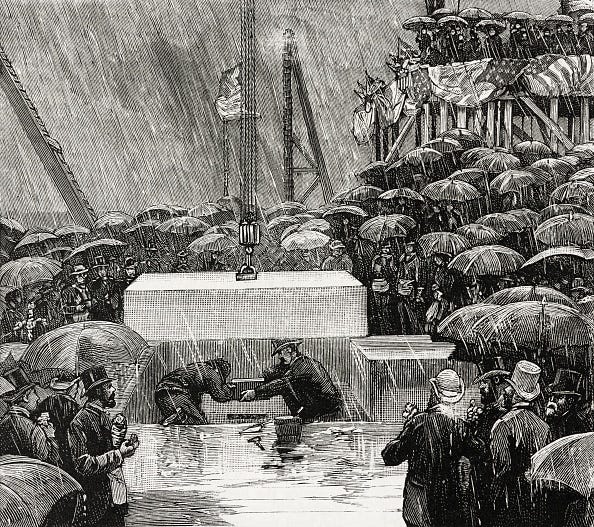The Writer's Almanac from Monday, August 5, 2013
"Next Time" by Joyce Sutphen, from After Words. © Red Dragonfly Press, 2013.
ORIGINAL TEXT AND AUDIO - 2013
Today in 1884, the cornerstone of the Statue of Liberty's pedestal was laid. It was largely funded by an auction of contributed art and literary works. Emma Lazarus, 34 years old at the time, donated a poem for the occasion, which she titled "The New Colossus."
Lazarus was devoted to the plight of Jewish immigrants, and she imagined that the statue would become a symbol of hope for all Ellis Island arrivals. The poem was forgotten for nearly 20 years, after which Lazarus' friends lobbied to have it emblazoned on a plaque and hung in the museum inside the pedestal. From there, it went on to define not just the monument but also the country's immigration policy. The poem ends in the voice of the lady of the harbor:
"Keep, ancient lands, your storied pomp!" cries she
With silent lips. "Give me your tired, your poor,
Your huddled masses yearning to breathe free,
The wretched refuse of your teeming shore.
Send these, the homeless, tempest-tost to me,
I lift my lamp beside the golden door!"
It's the birthday of Wendell Berry, born in Port Royal, Kentucky (1934). He grew up on farmland that had belonged to his family since 1803, and after college and some traveling, he moved back to that area permanently. He bought a small farm in his hometown, which still had a population of only a hundred or so people, and he began farming it the way his grandfather had taught him, without any machines. He grew squash, corn, and tomatoes, and he got a flock of sheep, a milk cow, and some horses. And he wrote about his experiences as a farmer in more than 40 books of poetry, fiction, and essays.
Wendell Berry said, "Do unto those downstream as you would have those upstream do unto you."
And speaking of the comics, The New York Daily News debuted the comic strip "Little Orphan Annie" on this day in 1924. It was canceled in 2010 after a run of nearly 86 years. The street-smart redhead inspired a radio show, a Broadway musical, three film adaptations, mass-marketed books, and merchandise that included everything from lunchboxes to curly wigs. Although only a fraction of this happened before the strip's creator, Harold Gray, died in 1968, it was enough to make him a millionaire.
Gray's wealth drew criticism during the Great Depression, when he used the strip to voice his populist political beliefs: namely, that the poor ought to pull themselves up by the bootstraps without government intervention or assistance. This is how his character Daddy Warbucks, the tuxedoed war profiteer, had succeeded, transforming his modest machine shop into a World War I munitions factory. Gray expressed his distaste for FDR and his New Deal in the strip's storylines, prompting one left-leaning writer to label it "Hooverism in the funnies." The public didn't seem to care — in 1937, "Little Orphan Annie" was the most popular comic in the country.
Be well, do good work, and keep in touch.®






If you look carefully at the bottom of the bronze plaque in the Statue of Liberty, you will see that it was made by Tiffany and Company, New York.
Beautiful choice of a poem by Ms. Sutphen. Thank you!